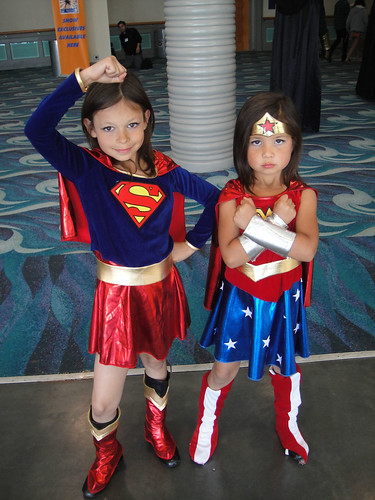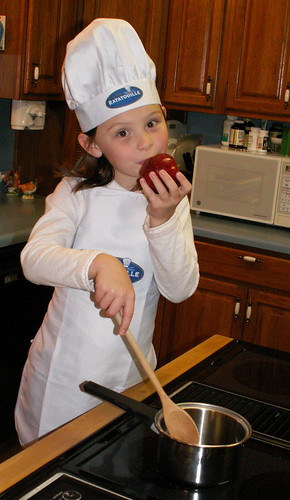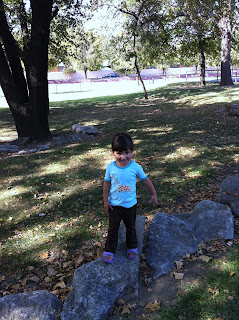I confessed to a couple of my dearest friends recently that although I love my kids dearly, I loathe playing with them. Don't get me wrong--I really enjoy being with my children. I delight in watching them play. But actually participating, getting on the floor, jumping into games and pretending stuff? That is hard. Really hard. It ranks about the same for me as small talk with someone with whom I have virtually nothing in common. On the outside I try to smile and look attentive, but on the inside I am fidgeting, looking at a mental clock and wondering how soon I can politely disengage.
Even though it is hard, I don't think I am especially good at it, and I rarely feel like doing it, I know that play is one of the most important things I can do with my children. Besides all of the skills that children acquire through play, it is the key to two of their deepest needs: power and connection.
Feeling helpless has got to be one of the absolute worst feelings in the world. And, face it, when your greatest power consists of choosing the red shirt instead of the blue shirt today, being able to control a situation in play, to make your own choices and even change everything through your imagination is huge. The key here is following your child's lead and not imposing your own preferences. Offer role-reversals. Let them be the parent and you be the child. Let them rescue you. The possibilities for empowering play are endless!
The other important by product of playing together is connection. I am not a particular fan of Sponge Bob or Spiderman, but my son is. And when I play with him, he learns that his interests, his likes and feelings are important to me. He matters.
Physical connection goes hand in hand with the emotional connection of play. Sometimes when our young explorers begin to move away from all the physical connections of breastfeeding, babywearing and bed sharing, we forget to make time for other healthy touch. Rough housing, tag, hide and seek, and other games that deal with separation and connection are important. We love the pushing game. Filling little love cups with fun filled physical affection is one of the best aspects of play.
Meeting the underlying needs for power and connection is one of the keys to effective discipline. People who feel empowered and connected are much more likely to behave in appropriate ways. But there are many other ways that play can be used in discipline.
Transitions are much smoother if we have a fun way to do them. Whenever we cross the parking lot, we all pick a different animal to imitate: stomping like elephants, wiggling our tails like little fish, hopping like bunnies (I excel at waddling like a penguin). We prefer non competitive games for the most part, but every now and then a race to see who can get buckled up first or make it to their seats is helpful. Classics like the Quiet Game or seeing who can win a silent stare down without laughing can be a great way to calm down after boisterous play.
Role playing is one of the most effective ways to learn any new skill. Want to practice acceptable behavior for restaurants? Play restaurant games! Have tea parties! Play library and practice using quiet voices. Get silly and use exaggerated, over the top examples. Do you have a runner? Play games like Red Light, Green Light or others that practice starting and stopping on cue. Talk about bullying and then role play different responses. For some games, you might want to provide a script. Or depending on your kids' mood or the situation, you may all improvise. Just make sure that you don't lose the fun in the teaching. If the educational aspect needs to take a back seat, so be it. They will still learn from the little bits that you do work in.
Going through a potty talk phase? Make a game of giving them nonsense words to use instead. When my three year old was randomly inserting "caca" into every sentence, we zeroed in on what he really wanted: the fun of our reaction. So we ignored that, but told him to never, ever say "snooglewoogles". Of course, he immediately did, and we played up our shock and horror, throwing up our hands and looking around to see if anyone had heard. Pretty soon, he decided that it was much more fun to say snooglewoogles.
Use play to provide a spoonful of sugar for unpleasant or boring tasks. My sweetlings can be very, er, inventive if left to distract themselves in a waiting room or other boring place. Ahem. Participating in their play or finding gentle ways to help direct it is necessary right now. Go retro with I Spy, pen and paper games or even making up stories together. If you need to all pick up the house, try tossing objects into a basket, setting a timer, picking up a specific color or type of object--anything to make it more fun. (I need extra motivation on this kind of thing, too!)
This is just the tip of the iceberg on ways that you can use play as a tool. The September 2011 Carnival of Natural Parenting is full of fabulous posts on this topic. Read to the end to find all the links. :) For more inspiration and ideas, get Playful Parenting by Lawrence Cohen. Discipline is not supposed to be miserable--it should be delightful. Playing with your kids is one of the most powerful tools you will ever find.
Moving away from punitive parenting requires a brand new set of tools. Let's open it up together! For the rest of the series, click here. And if gentle discipline is revealing areas where you need to work on yourself, see if any of these personal tools resonate with you.
Looking for more practical tips? Check out my favorite post from the Hippie Housewife on The Hows of Discipline (and read through all the comments!), Pearl in Oyster's 52 Tool Cards series and Aha! Parenting's blog. Do you need inspiration and a reminder of why and how to do this? Read Emerging Mummy's Practices of Mothering and Positive Parenting: Toddlers and Beyond. If you have other great resources or ideas, please add them in the comments.
Even though it is hard, I don't think I am especially good at it, and I rarely feel like doing it, I know that play is one of the most important things I can do with my children. Besides all of the skills that children acquire through play, it is the key to two of their deepest needs: power and connection.
 |
| Image credit PopCultureGeek on Flickr |
The other important by product of playing together is connection. I am not a particular fan of Sponge Bob or Spiderman, but my son is. And when I play with him, he learns that his interests, his likes and feelings are important to me. He matters.
Physical connection goes hand in hand with the emotional connection of play. Sometimes when our young explorers begin to move away from all the physical connections of breastfeeding, babywearing and bed sharing, we forget to make time for other healthy touch. Rough housing, tag, hide and seek, and other games that deal with separation and connection are important. We love the pushing game. Filling little love cups with fun filled physical affection is one of the best aspects of play.
Meeting the underlying needs for power and connection is one of the keys to effective discipline. People who feel empowered and connected are much more likely to behave in appropriate ways. But there are many other ways that play can be used in discipline.
Transitions are much smoother if we have a fun way to do them. Whenever we cross the parking lot, we all pick a different animal to imitate: stomping like elephants, wiggling our tails like little fish, hopping like bunnies (I excel at waddling like a penguin). We prefer non competitive games for the most part, but every now and then a race to see who can get buckled up first or make it to their seats is helpful. Classics like the Quiet Game or seeing who can win a silent stare down without laughing can be a great way to calm down after boisterous play.
Role playing is one of the most effective ways to learn any new skill. Want to practice acceptable behavior for restaurants? Play restaurant games! Have tea parties! Play library and practice using quiet voices. Get silly and use exaggerated, over the top examples. Do you have a runner? Play games like Red Light, Green Light or others that practice starting and stopping on cue. Talk about bullying and then role play different responses. For some games, you might want to provide a script. Or depending on your kids' mood or the situation, you may all improvise. Just make sure that you don't lose the fun in the teaching. If the educational aspect needs to take a back seat, so be it. They will still learn from the little bits that you do work in.
Going through a potty talk phase? Make a game of giving them nonsense words to use instead. When my three year old was randomly inserting "caca" into every sentence, we zeroed in on what he really wanted: the fun of our reaction. So we ignored that, but told him to never, ever say "snooglewoogles". Of course, he immediately did, and we played up our shock and horror, throwing up our hands and looking around to see if anyone had heard. Pretty soon, he decided that it was much more fun to say snooglewoogles.
Use play to provide a spoonful of sugar for unpleasant or boring tasks. My sweetlings can be very, er, inventive if left to distract themselves in a waiting room or other boring place. Ahem. Participating in their play or finding gentle ways to help direct it is necessary right now. Go retro with I Spy, pen and paper games or even making up stories together. If you need to all pick up the house, try tossing objects into a basket, setting a timer, picking up a specific color or type of object--anything to make it more fun. (I need extra motivation on this kind of thing, too!)
This is just the tip of the iceberg on ways that you can use play as a tool. The September 2011 Carnival of Natural Parenting is full of fabulous posts on this topic. Read to the end to find all the links. :) For more inspiration and ideas, get Playful Parenting by Lawrence Cohen. Discipline is not supposed to be miserable--it should be delightful. Playing with your kids is one of the most powerful tools you will ever find.
***********
![[4/365] Handy Man](http://farm6.static.flickr.com/5086/5326211358_693c15804a.jpg) |
| Image credit goaliej54 on Flickr |
Looking for more practical tips? Check out my favorite post from the Hippie Housewife on The Hows of Discipline (and read through all the comments!), Pearl in Oyster's 52 Tool Cards series and Aha! Parenting's blog. Do you need inspiration and a reminder of why and how to do this? Read Emerging Mummy's Practices of Mothering and Positive Parenting: Toddlers and Beyond. If you have other great resources or ideas, please add them in the comments.















